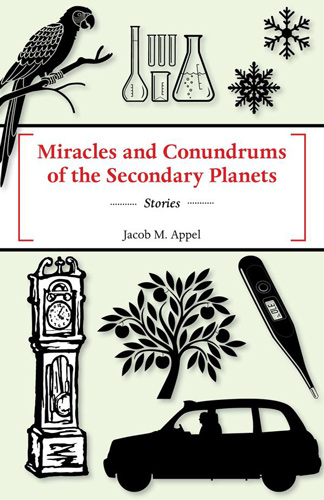Miracles and Conundrums of the Secondary Planets
The eight stories in Jacob M. Appel’s Miracles and Conundrums of the Secondary Planets are engaging, surprising, and often deeply affecting. They sometimes feature bizarre, fantastic details—a man grapples with the real possibility of his mistresses’ impending resurrection, a global cold snap rattles our understanding of global warming—but these features never distract from the human stories at the center of every tale. The eight stories in Jacob M. Appel’s Miracles and Conundrums of the Secondary Planets are engaging, surprising, and often deeply affecting. They sometimes feature bizarre, fantastic details—a man grapples with the real possibility of his mistresses’ impending resurrection, a global cold snap rattles our understanding of global warming—but these features never distract from the human stories at the center of every tale.
Even in the title piece, with an extraterrestrial main character, Appel focuses attention on a personal—if not human—relationship. Red Ziggy, though he possesses little knowledge of the country and cuisine, runs a Latvian restaurant opposite an abortion clinic in Alabama. He finds himself in an unexpected relationship with a young pro-life demonstrator: “The cold reality sank in that his intentions with this girl—whatever they might be—did not comply with either the letter or the spirit of his mission.” He continues tentatively pursuing the relationship, despite any contradictions with his official mission. Though Ziggy’s species kisses without touching, his struggles to bond with the young woman are rendered as more human than alien. Something more than space fantasy is at stake.
The piece “Measures of Sorrow,” which first appeared in Story Quarterly, gives a snapshot into the worlds of two characters living with feelings of a distinctly American alienation. The narrator is writing a dissertation on the controversy over the finite quantity of tears to be shed before the Messiah’s return: Should this be measured by the volume or number of individual tears? A mysterious man surprises the academic by sneaking into his apartment and making a strange request:
‘I want you to teach me. To tutor me.’
Tutor him? He was lucky I hadn’t stabbed him. ‘In what?’
Ollie paused—either to collect his thoughts or for dramatic effect.
‘Everything,’ he said. ‘Everything that they teach at the university.’
The sadness-focused narrator tackles the impossible task, and Appel skillfully builds the story to a poignant conclusion.
Some of the stories close with more emotional punch than others, though “Phoebe with Impending Frost” fizzles a bit in the final paragraphs. A climatologist once labeled as a crackpot is vindicated by global cooling. During his time of icy validation, he reencounters his biggest adolescent crush, who is married with kids, and pursues some sort of relationship with her. I believed in the characters; perhaps I loved them. I wanted them to find narrative—if not personal—resolution. I questioned whether the conclusion of this story, and of a few others, gave them that end. This isn’t entirely bad. I cared for Appel’s characters enough to want them to reside in impossibly perfect narratives. If some of the stories feel open-ended, they are made so with clear intent. Though you might want to know what else happens, Appel won’t tell you, and the satisfaction of such endings is atypical, not absent.
The final sentences of the story “Measures of Sorrow” may seem reductive, but they pack one hell of a punch in context:
I carried inside me this story, of Ollie’s education, and my own, but I knew nobody with whom to share it. You can measure a man’s sorrow, and the world’s, in the number of stories that perish unheard.
These stories won’t completely salve readers struggling with the loneliness of the human condition, but they might make the accompanying sorrow less measurable. Don’t let Appel’s stories go unheard.





